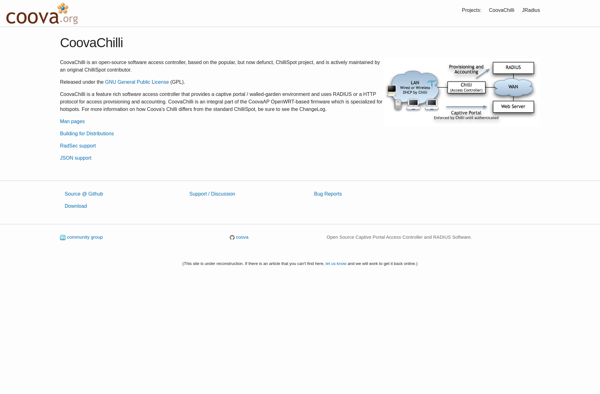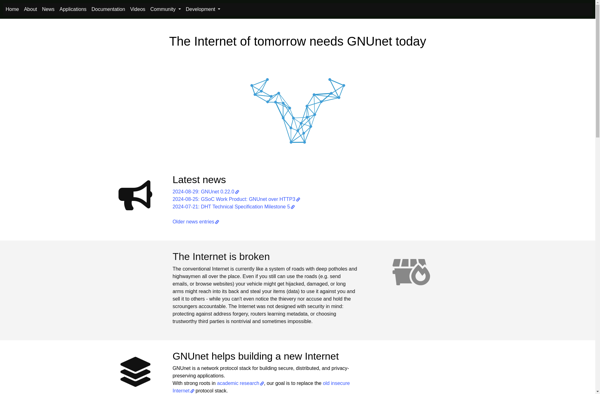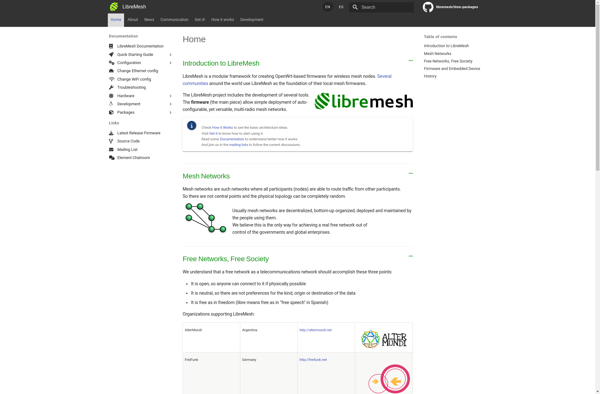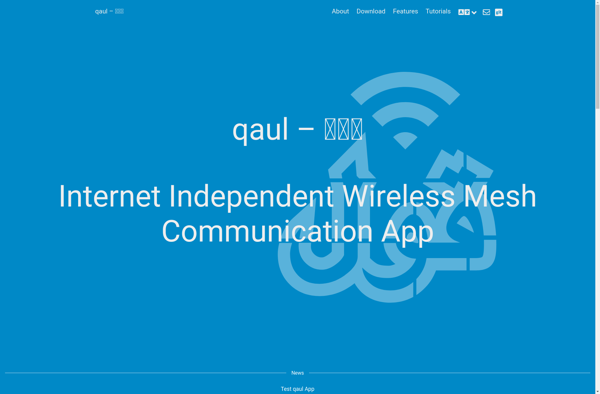SMesh
SMesh is an open-source, decentralized messaging and social networking platform that provides privacy and security. It allows users to communicate securely through encrypted messaging, voice calls, video calls, and file sharing.
SMesh: Open-Source Decentralized Messaging & Social Networking
A secure and private platform for messaging, voice, video calls, and file sharing, built on open-source principles.
What is SMesh?
SMesh is an open-source, decentralized messaging and social networking platform that prioritizes user privacy and security. It is built on peer-to-peer networking technology which eliminates the need for centralized servers, providing resistance against hacking, censorship, and mass surveillance.
Some key features of SMesh include:
- Encrypted messaging - All texts, media, and files shared on SMesh are end-to-end encrypted so only the sender and recipient can view them.
- Secure voice/video calling - Voice and video calls on SMesh use peer-to-peer streaming for security and stability.
- User profiles & social features - Users can create profiles, add contacts, publish status updates with privacy controls.
- Open source codebase - The platform is transparent, community-driven, and customizable via plugins and themes.
- Cross-platform availability - Native SMesh apps are available for desktop (Windows, Mac, Linux) and mobile (iOS, Android).
Overall, SMesh strives to give users control over their communications, connections, and personal data through decentralized infrastructure and encryption protocols.
SMesh Features
Features
- End-to-end encrypted messaging
- Decentralized architecture
- Open source code
- Anonymous accounts
- Group chats
- Voice and video calling
- File sharing
- Cross-platform availability
Pricing
- Open Source
Pros
Strong privacy and security
No central entity controls data
Open source code enables transparency and trust
Resistant to censorship
Works offline with no internet access
Free to use
Cons
Smaller user base than mainstream apps
Requires more technical know-how from users
Metadata still visible to nodes
Usability not as refined as mainstream apps
Official Links
Reviews & Ratings
Login to ReviewThe Best SMesh Alternatives
Top Social & Communications and Messaging and other similar apps like SMesh
Here are some alternatives to SMesh:
Suggest an alternative ❐CoovaChilli
CoovaChilli is an open-source captive portal and access controller software designed for authentication and accounting of users on wireless LAN access points. It provides a captive portal interface for user authentication using a web browser and controls access to the internet by authenticating MAC addresses of clients.Some key features of...

GNUnet
GNUnet is an open-source framework for decentralized, peer-to-peer networking designed to provide secure communication and basic services without the need for centralized servers. Developed as part of the GNU Project, GNUnet aims to replace the current client-server model of the internet with a more decentralized architecture.At its core, GNUnet provides...

The Serval Project
The Serval Project is an open-source software initiative that enables decentralized and secure voice calling, text messaging, and file sharing between mobile devices. It was founded in 2012 by researchers at Flinders University in Australia to provide communications in areas impacted by natural disasters or other causes of damaged infrastructure...

LibreMesh
LibreMesh is open source firmware that is designed to run on wireless routers and create mesh networks. It provides an alternative to traditional WiFi setups by allowing multiple LibreMesh-enabled routers to connect with each other in a decentralized manner.Some key features and capabilities of LibreMesh include:Designed for wireless community networks...

Ninux
Ninux is a free, open-source, decentralized mesh network software and community project that allows computers, mobile devices, and other hardware to connect directly to each other and share internet access without an internet service provider. It creates a local area peer-to-peer network using wireless network connections like WiFi or Bluetooth.The...

Cjdns
cjdns is an open-source encrypted mesh networking protocol and software that allows distributed peer-to-peer applications to run on an overlay network rather than relying on conventional Internet addressing systems. The goal of cjdns is to build a decentralized alternative to the existing internet routing and infrastructure by replacing IP addresses...

Telehash
Telehash is an open-source networking protocol and software library that enables peer-to-peer connections between devices and servers without relying on centralized servers or services. It allows applications and devices to directly connect and communicate securely via the internet.The key principle behind Telehash is the use of cryptographic hashes to establish...

Babel (protocol)
Babel is an open-source intermediary messaging protocol that aims to allow different messaging platforms and networks to interconnect by translating messages between them. The goal of Babel is to remove the barriers that exist between the major messaging apps and enable seamless communication between users on different networks.Here is how...

OLSR (Optimized Link State Routing)
OLSR (Optimized Link State Routing) is a proactive link-state routing protocol optimized for mobile ad hoc networks (MANETs). It is designed to work in a completely distributed manner and does not depend on any central entity. The key optimizations OLSR makes compared to classical link state routing are:- It minimizes...

Qaul
Qaul is an open source communication tool for creating community wireless networks without the use of Internet connectivity or mobile networks. It only requires an Android phone with WiFi, Bluetooth, or NFC capabilities to function. The goal of Qaul is to facilitate peer-to-peer communication in areas where traditional networks and...

Digitata
Digitata is an enterprise data monitoring and analytics platform designed to provide organizations with real-time visibility into their critical business data. The software consolidates data from across multiple systems and applies machine learning to detect anomalies, identify trends and patterns, and surface actionable insights.Key capabilities and benefits of Digitata include:Real-time...

CCNx
CCNx (Content Centric Networking) is an open source networking protocol optimized for efficient content distribution and retrieval. Instead of addressing endpoints like traditional IP networks, CCNx names and secures the data itself, allowing it to be efficiently cached and replicated at multiple points throughout the network.This content-centric design provides native...